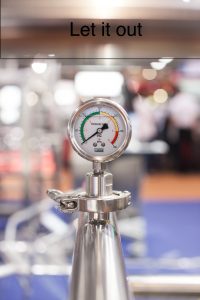Is the pressure in DJ life having an impact on mental health?

Pressure and stress are normal aspects of daily life, demands to meet targets or achieve goals within a specified time are not unusual.
Stress often manifests itself when we put ourselves under pressure to achieve or produce a good outcome. Stress helps us focus on completing the task at hand, when it is at manageable levels, it only becomes a problem when it begins to overwhelm our thoughts and impact on wellbeing. This can result in poor mental health outcomes, anxiety, depression or even suicide. some of which can be linked to our personality.
We all have a personality type(s), which can have an influence on our emotions and behaviour. Can this impact on how DJs perform?
Personality
This has an influence on who we are and how we behave, personality traits/types have an important role in how we respond to situations. Depending on which theoretical model you use they do have strong elements of crossover, Myers Briggs identified 16 types. They also provide a self-assessment to help people identify which type they may be.
How does this apply to the DJ/Producer?
Type can be significant in how DJs respond/behave in certain environments. Within these personality types, there are two that are significant and help us understand why some DJs may struggle in social settings.
The introvert type is less inclined to enjoy being in the limelight or in a crowded social setting, they also find small talk noninspiring and uncomfortable.

Signs that you’re an Introvert
1. You enjoy spending plenty of time alone.
2. Your inner monologue is hard to shut off.
3. You do your best thinking alone.
4. You often feel lonelier in a crowd than when you’re alone.
5. You feel like you’re faking it when you have to network.
6. You have no desire to be the
As you can imagine being an introvert and DJ makes life just that little more challenging and potentially
Whereas an extrovert is the opposite, finds attention desirable and often seeks to be at the
So DJs who are more extrovert find the whole attention and performance a much more positive experience, finding the party scene far less stressful.

Signs that you’re an Extrovert
1. Enjoys being the center of attention.
2. Likes to start conversations.
3. Enjoys meeting new people
4. Has a wide social circle of friends and acquaintances.
5. Finds it easy to make new friend Feels
6. Say things before thinking about them.
So if your personality is more extrovert inclined then performing and mixing with people is your playground. This is no guarantee that you will not suffer from stress, anxiety or depression. The business does carry high levels of pressure, but it may mean you can adapt to being thrust into the limelight more readily than an introvert.
For the majority of the population extrovert or introvert may not be problematic, we tend to find roles that suit our personality types more often than not. To be honest most people will be somewhere on a sliding scale between the two polarities. Either way, it is important to acknowledge how your personality may be a factor in your mental health management. It may be worth trying one of the many personality tests to satisfy a curiosity.
Looking after your mental health
1. Be active
Staying active and engaging in regular exercise helps keep the mind and body healthy. It also improves sleep, concentration, and keeps vital organs healthy.
2. Eat well
Having a healthy diet keeps the body and mind in good condition, ensuring the right nutrients are part of your eating habit is essential to both physical and mental wellbeing.
3. Drink sensibly
Alcohol may improve mood, but it is temporary, if it is used to manage negative feelings or emotions. It can have a counter effect impact on physical and mental wellbeing, particularly if use is regularly excessive.
4. Talk about how you feel
Talking about the way you are feeling can help you stay in good mental health and deal with times when you feel troubled. It’s not a weakness to share when your feeling, stressed, anxious, low or depressed.
5. Find time to chill
It’s easy to get wrapped up in your work or pressure to meet the next deadline. Take time out and relax and do something you enjoy or are good at that has nothing to do with work. This is essential for your mental health.
5. Sleep
Sleep is essential to our physical and mental health. It
There are many things you can do to improve your quality of sleep including exercise, avoiding stimulants and implementing a daily routine or bed-time. In the case of a touring DJ, finding time for quality sleep needs to be an essential part of the tour programme, staying alert and reducing tiredness is crucial to good mental wellbeing.
6. Stay connected
Family and friends can be a good source of support, making time is key to not drifting into isolation. Make time to join in family events and hang out with friends, they are a good source of familiar contact.
7. Take a break
A change of scene or a change of pace is good for your mental health.
It could be a five-minute pause from producing a new track or planning your next set, take a lunch break, or a weekend exploring somewhere new. A few minutes can be enough to de-stress you. Give yourself some ‘me time’. You may even want to try meditation or mindfulness. “Use your time wisely. Meditate, go over your thoughts, your plans, your goals. Keep yourself centered and humble. Enjoy every bit of it, learn to be grateful and patient”. ( interview with Brian Cid- Magnetic Magazine 2019)
8. Accept who you are
Everybody has different ways of working, methods, standards, be kind to yourself and
9. Drugs won’t help
Avoid using substances to manage your mental health, they will only offer short term relief, the problems and issues will not go away and could be made worse. Particularly anxiety and depression can result in you thinking more drugs are required to feel better, which could end in addiction or feelings of despair.
Release the pressure

Keeping on top of the stresses and anxiety of life in the DJ/Production world is essential for a long and fruitful career. Looking after your mental health should be as important as your performances and productions, keeping it in Sync is key to keeping well and positive about life.
There has been a lot of publicity in recent years, particularly the death Tim Bergling (Avicii) and now the sudden death of Keith Flint (Prodigy), about depression and suicide within the industry. The business is fraught with pressure, stress, anxiety, addiction
The performance industry can be very isolating at times and expectation can be high, this adds extra pressure on the mind, body
If you would like to discuss any concerns about your mental health you can contact us at outofsynctherapy.com
If you are in distress then you can talk